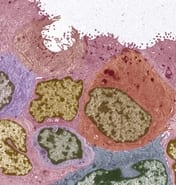Fine-Needle Aspiration Biopsy
 A fine-needle aspiration (FNA) biopsy is used to determine whether or not suspicious growths found in the body are cancerous. It is often used for biopsies of breast tissue or of the thyroid gland. Unlike a surgical biopsy, fine-needle aspiration biopsy is a nonsurgical procedure requiring minimal downtime. It is fast and relatively painless, and most often provides accurate results.
A fine-needle aspiration (FNA) biopsy is used to determine whether or not suspicious growths found in the body are cancerous. It is often used for biopsies of breast tissue or of the thyroid gland. Unlike a surgical biopsy, fine-needle aspiration biopsy is a nonsurgical procedure requiring minimal downtime. It is fast and relatively painless, and most often provides accurate results.
Reasons for a FNA Biopsy
Fine-needle aspirations are most often performed to diagnose swellings or lumps located just under the skin. If a nodule or lump is found upon physical examination or during a diagnostic imaging tests, such as a CT or MRI scan, a mammogram, or ultrasound, the doctor may decide that a fine-needle aspiration biopsy is necessary to investigate whether the abnormal growth is malignant or benign. Most fine needle aspirations are performed on:
- The breast
- The thyroid gland
- Lymph nodes in the neck, groin, or armpit
Most breast lumps are not cancerous, so the FNA biopsy, which is only minimally invasive, is an appropriate choice. Furthermore, if the lump detected is determined to be a cyst, it can be drained of fluid during the same procedure. If lumps reappear, though they may only be cysts that have refilled with fluid, they should always be shown to the doctor again.
When a suspicious nodule is discovered in the thyroid gland, or in one of the lymph notes, fine-needle aspirations may also be deemed the first means of exploring possibly dangerous tissue.
At times, suspect tissue can also appear inside the chest or abdomen. Rather then perform invasive surgery, the doctor may opt to confirm the diagnosis using a fine-needle aspiration. In such cases, the physician uses an endoscope, a flexible tube attached to a miniature light and camera, to locate targeted abnormalities on which a fine-needle aspiration biopsy can be performed.
The FNA Biopsy Procedure
Some patients may be instructed to stop taking any blood thinners, including aspirin, prior to an FNA biopsy. Others may be advised not to eat or drink anything for several hours before the test. Since patients are typically sedated during the procedure, it is necessary that they arrange to be driven home afterwards.
Prior to the FNA biopsy procedure, the targeted area will be thoroughly cleansed with antiseptic and a local anesthetic will be injected under the skin. Ultrasound is often used to guide the physician to the precise area in which the syringe will be inserted. Once the thin needle attached to the syringe is inserted into the affected area, a vacuum inside the syringe suctions body fluid or tissue into the syringe. When performed directly into the skin, this procedure takes an average of 10 to 15 minutes.
If the sample is taken endoscopically, however, the procedure takes somewhat longer, usually about an hour, since the endoscope has to be inserted in the patient's mouth and down into the proper region of the chest or abdomen before the FNA biopsy can proceed.
The biopsy sample is occasionally examined immediately under a microscope. More frequently, the specimen is sent to the laboratory and results will be available in approximately 3 days. At times, preliminary results may be available sooner, but complete results may take as long as a week. They have an accuracy rate of approximately 85 percent.
Recovery from FNA Biopsy
Because the FNA biopsy may be taken while the patient is sedated, some grogginess upon waking is be expected. There may be some discomfort, swelling, soreness, or pain in the region biopsied, and, in the case of an endoscopic procedure, in the throat as well. Normally, over-the-counter painkillers are sufficient to relieve any discomfort after the procedure.
Complications of a FNA Biopsy
An FNA biopsy is considered a safe procedure. In rare cases, persistent bruising under the skin may occur, resulting in a tender swollen region known as a hematoma, or the patient may develop a fever. In either instance, the patient should contact the doctor immediately because these symptoms may indicate an infection. There is a slightly higher risk of complications with an FNA biopsy that is performed endoscopically, thought the risk level is still very low.
For more information about Fine-Needle Aspiration Biopsy, Call Arash Padidar's office at 408-918-0405

